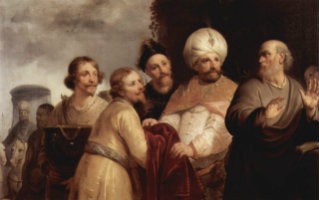Perpetual shalom: Elisha's gift to Naaman

I worked in a filling station for four years. One day I hurt my back working under the grease rack, and for a while my father, a rural pastor, regularly drove me 12 miles from our small town to another small town to see a chiropractor. Dr. Holt was an old-time jerk-and-twist chiropractor and a Missouri Synod Lutheran layman—what else could he have been in a Missouri town called Concordia? He usually charged $3 for an adjustment, but after every appointment my dad would say to him, “Well, Doc, what do I owe you?” and every time Dr. Holt would answer, “Just a dollar, Reverend.” My dad wanted to be fair, but he was poorly paid himself. So the two of them—the Missouri Synod Lutheran layman and the Evangelical and Reformed pastor—always did this delicate dance of payment.
Of course, my dad was not the last guy to worry about paying for health care, but these days he wouldn’t have to ask. The doctor’s staff would tell him about the co-payment, a concept that would have confounded both Dad and Dr. Holt.
Another guy who wanted to settle up for his health care was Naaman, the big-time Syrian general. Remember Naaman in 2 Kings 5? He was a political general, a kind of Colin Powell back in Damascus. He looked in the mirror one day and noticed spots on his nose. It was leprosy, a social disease that would exclude him from public life and threaten a career backed by an impressive set of medals. Then a young slave girl, captured in one of Syria’s many wars with Israel, told him about healing available from “the prophet who is in Samaria.” The general promptly went to Samaria.




